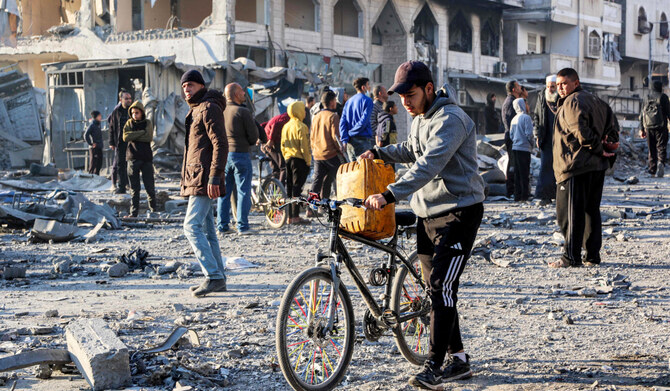TEL AVIV, Israel: A rocket strike Saturday at a soccer field killed at least 11 children and teens, Israeli authorities said, in the deadliest strike on an Israeli target along the country’s northern border since the fighting between Israel and the Lebanese militant group Hezbollah began. It raised fears of a broader regional war.
Israel blamed Hezbollah for the strike in the Israeli-controlled Golan Heights, but Hezbollah rushed to deny any role. Israeli Prime Minister Benjamin Netanyahu warned that Hezbollah “will pay a heavy price for this attack, one that it has not paid so far.”
The Israeli military’s chief spokesman, Rear Adm. Daniel Hagari, called it the deadliest attack on Israeli civilians since the Hamas attack on Oct. 7 that sparked the war in Gaza. He said 20 others were wounded.
“There is no doubt that Hezbollah has crossed all the red lines here, and the response will reflect that,” Israeli Foreign Minister Israel Katz told Israeli Channel 12. “We are nearing the moment in which we face an all-out war.”
Hezbollah chief spokesman Mohammed Afif told The Associated Press that the group “categorically denies carrying out an attack on Majdal Shams.” It is unusual for Hezbollah to deny an attack.
The strike at the soccer field, just before sunset, followed earlier cross-border violence on Saturday, when Hezbollah said three of its fighters were killed, without specifying where. Israel’s military said its air force targeted a Hezbollah arms depot in the border village of Kfar Kila, adding that militants were inside at the time.
Hezbollah said its fighters carried out 10 different attacks using rockets and explosive drones against Israeli military posts, the last of which targeted the army command of the Haramoun Brigade in Maaleh Golani with Katyusha rockets. In a separate statement, Hezbollah said it hit the same army post with a short-range Falaq rocket. It said the attacks were in response to Israeli airstrikes on villages in southern Lebanon.
The office of Netanyahu, who was on a visit to the United States, said he would cut short his trip by several hours, without specifying when he would return. It said he will convene the security Cabinet after arriving.
Far-right members of Netanyahu’s government called for a harsh response against Hezbollah. But an all-out war with a militant group with far superior firepower to Hamas would be trying for Israel’s military after nearly 10 months of fighting in Gaza.
Footage aired on Israeli Channel 12 showed a large blast in one of the valleys in the Druze town of Majdal Shams, in the Golan Heights, which Israel captured from Syria in the 1967 Mideast war and annexed in 1981. Some Druze have Israeli citizenship. Many still have sympathies for Syria and rejected Israeli annexation, but their ties with Israeli society have grown over the years.
Video showed paramedics rushing stretchers off the soccer field toward waiting ambulances.
Ha’il Mahmoud, a resident, told Channel 12 that children were playing soccer when the rocket hit the field. He said a siren was heard seconds before the rocket hit, but there was no time to take shelter.
Jihan Sfadi, the principal of an elementary school, told Channel 12 that five students were among the dead: “The situation here is very difficult. Parents are crying, people are screaming outside. No one can digest what has happened.”
Israel’s military said its analysis showed that the rocket was launched from an area north of the village of Chebaa in southern Lebanon.
The White House National Security Council in a statement said the US “will continue to support efforts to end these terrible attacks along the Blue Line, which must be a top priority. Our support for Israel’s security is iron-clad and unwavering against all Iranian-backed terrorist groups, including Lebanese Hezbollah.”
Lebanon’s government, in a statement that didn’t mention Majdal Sham, urged an “immediate cessation of hostilities on all fronts” and condemned all attacks on civilians.
Israel and Hezbollah have been trading fire since Oct. 8, a day after Hamas militants stormed into southern Israel. In recent weeks, the exchange of fire along the Lebanon-Israel border has intensified, with Israeli airstrikes and rocket and drone attacks by Hezbollah striking deeper and farther away from the border.
Majdal Shams had not been among border communities ordered to evacuate as tensions rose, Israel’s military said, without saying why. The town doesn’t sit directly on the border with Lebanon.
Officials from countries including the United States and France have visited Lebanon to try to ease the tensions but failed to make progress. Hezbollah has refused to cease firing as long as Israel’s offensive in Gaza continues. Israel and Hezbollah fought an inconclusive war in 2006.
Saturday’s violence comes as Israel and Hamas are weighing a ceasefire proposal that would wind down the nearly 10-month war in Gaza and free the roughly 110 hostages who remain captive there. Hamas’ attack on Oct. 7 killed some 1,200 people and took 250 others hostage. Israel’s offensive has killed more than 39,000 people, according to local health authorities.
Since early October, Israeli airstrikes in Lebanon have killed more than 450 people, mostly Hezbollah members, but also around 90 civilians and non-combatants. On the Israeli side, 44 have been killed, at least 21 of them soldiers.





























